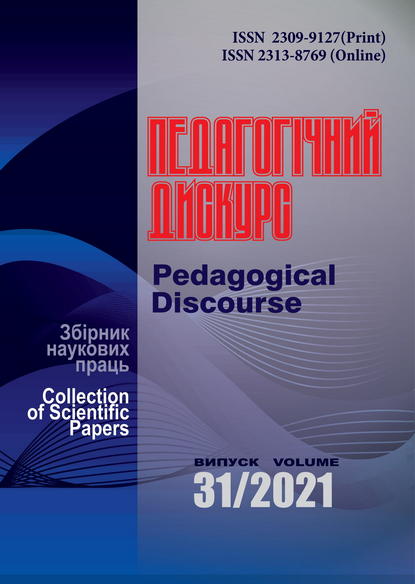Іntroduction of Distance Learning in the Educational Process of Medical Higher Educational Institutions
Abstract
The article analyzes the main disadvantages and advantages of using distance learning in the educational process of the educational institution. In the conditions of development of the modern system of medical education, the level of professional training of medical and pharmaceutical workers is especially acquired. The activities of medical institutions are being reorganized on the basis of the use of information and communication technologies and intensive updating of various reporting information, so increasing the information and digital competence of participants in the educational process is now demanded. Since the beginning of the COVID-19 pandemic, most educators have spent the school year outside the school, which requires the effective introduction of information and communication technologies in the educational process during distance learning in the conditions of lockdown. Possibilities of creating a model of organization of the educational process under the conditions of using information and communication technologies have been studied. The activity of participants of educational process at distance learning is substantiated. The analysis of the resources provided an opportunity to conclude that the use of information and communication technologies (ICT) is a complex and multidimensional process. The effectiveness of information and communication technologies in the education of students depends on the teacher’s ability to reorganize the educational process on the basis of student-centered, problem-based, competence and activity approaches. This contributes to the development of students’ need for self-improvement, scientific research; develops the ability to analyze, observe, compare, draw conclusions, put forward original ideas. The role of ICT for participants in the educational process is an opportunity to access various sources of information, improving skills in operating systems, search, creation, promotion and use of digital resources, communication, cooperation and self-development in remote webinars, conferences, seminars. This generally helps to increase the level of independence in writing projects, research, professional skills.
In order to determine the basic level of digital competence of the teaching staff, we conducted a self-assessment of their own digital competence due to a 12-point system. Based on the results of self-assessment of digital competence, we can conclude that teachers who have more than 30 years of teaching experience believe that they mostly have information and digital competence at an average and sufficient level. They prefer offline learning, especially when it comes to laboratory and practical work. Young teachers prefer online learning, they believe that distance learning saves reagents, students can observe a chemical experiment several times, the teacher greatly simplifies the mechanism of evaluation and obtaining a quick result by the students, and the ability to refine educational material.
According to the results of the surveys, the following results were obtained:
– analysis of the questionnaire of students’ parents showed the following results: 95% of the parents are generally satisfied with distance learning; 12% of parents want to increas the number of training programs; 15% of parents want give more time for the students to study the theoretical material; 18% of parents would increase the amount of time to perform test tasks and provide the opportunity to retake them within ten days;
– analysis of questionnaires of students showed the following results: 95% of sudents are satisfied with the level of distance learning; 15% of students would reduce the number of tasks on the chains of transformation; 25% of students would provide more attempts for retaking the tasks; 16% of students would increase the number of points for a long-term task; 9% of the students want to study offline; 85% of students prefer blended learning, including online lectures and offline practical lessons.
It is noted that the effectiveness of distance learning increases with the educational process implementation through student-centered, problem-based, competence and activity approaches. The effectiveness of distance learning depends on the level of digital competence of a teacher and a student, clearly defined types of control tasks, friendly atmosphere during communication when advising students, analysis of errors and recommendations are the main ways to eliminate them. Based on this, the main structural components of the organization of distance and blended learning are: motivating; meaningful; organizational; training and practical; supervisory; effective.
Downloads
References
Buzhykov, R. P. (2011). Dydaktychnyi potentsial Internet-tekhnolohii v suchasnii systemi osvity [Didactic Potential of Internet Technologies in the Modern Education System]. Problemy osvity – Problems of Education, 66 (II), 40–45. [in Ukrainian].
Hurzhii, A. M., & Lapinskyi, V. V. (2013). Elektronni osvitni resursy yak osnova suchasnoho navchalnoho seredovyshcha zahalnoosvitnikh navchalnykh zakladiv [Electronic Educational Resources as the Basis of the Modern Educational Environment of Secondary Schools]. Informatsiini tekhnolohii v osviti – Information Technologies in Education, 15, 30–37. [in Ukrainian].
Doroshenko, Yu., Semeniuk, N., & Semko, L. (2005). Khimiia ta ekolohiia z kompiuterom [Chemistry and Ecology with a Computer]. Kyiv: Shkilnyi svit. [in Ukrainian].
Zhabieiev, H. V. (2009). Metodyka vykorystannia Internet-resursiv u protsesi profilnoho navchannia khimii [Methods of Using Internet Resources in the Process of Specialized Teaching of Chemistry]: Candidate’s thesis: 13.00.02. Kyiv. [in Ukrainian].
Lapshyna, I. S. (2012). Adaptyvni pidkhody do modeliuvannia osvitnikh protsesiv u systemi dystantsiinoho navchannia [Adaptive Approaches to Modeling Educational Processes in the Distance Learning System]. Kompiuter u shkoli ta simi – Computer in School and Family, 6, 42–47. [in Ukrainian].
Morze, N. V., Kocharian, A. B. (2014). Model standartu IKT-kompetentnosti vykladachiv universytetu v konteksti pidvyshchennia yakosti osvity [Model of ICT Competence Standard of University Teachers in the Context of Improving the Quality of Education]. Informatsiini tekhnolohii i zasoby navchannia – Information Technologies and Teaching Tools, 5, 27–39. [in Ukrainian].
Tsarenko, V. O. (2013). Rozvytok informatsiino-komunikatsiinykh kompetentnostei shkoliariv zasobamy virtualnoho seredovyshcha vebinaru [Development of Information and Communication Competencies of Schoolchildren by Means of the Virtual Environment of the Webinar]. Virtualnyi osvitnii prostir: psykholohichni problemy – Virtual Educational Space: Psychological Problems: Abstracts of Papers of the 2-nd International Scientific and Practical Conference. Retrieved from http://www.newlearning.org.ua/content/tezi-dopovidey-2-yi-mizhnarodnoyi-naukovo-praktichnoyi-konferenciyi-virtualniy-osvitniy. [in Ukrainian].
Copyright (c) 2021 Pedagogical Discourse

This work is licensed under a Creative Commons Attribution-NonCommercial-ShareAlike 4.0 International License.

















